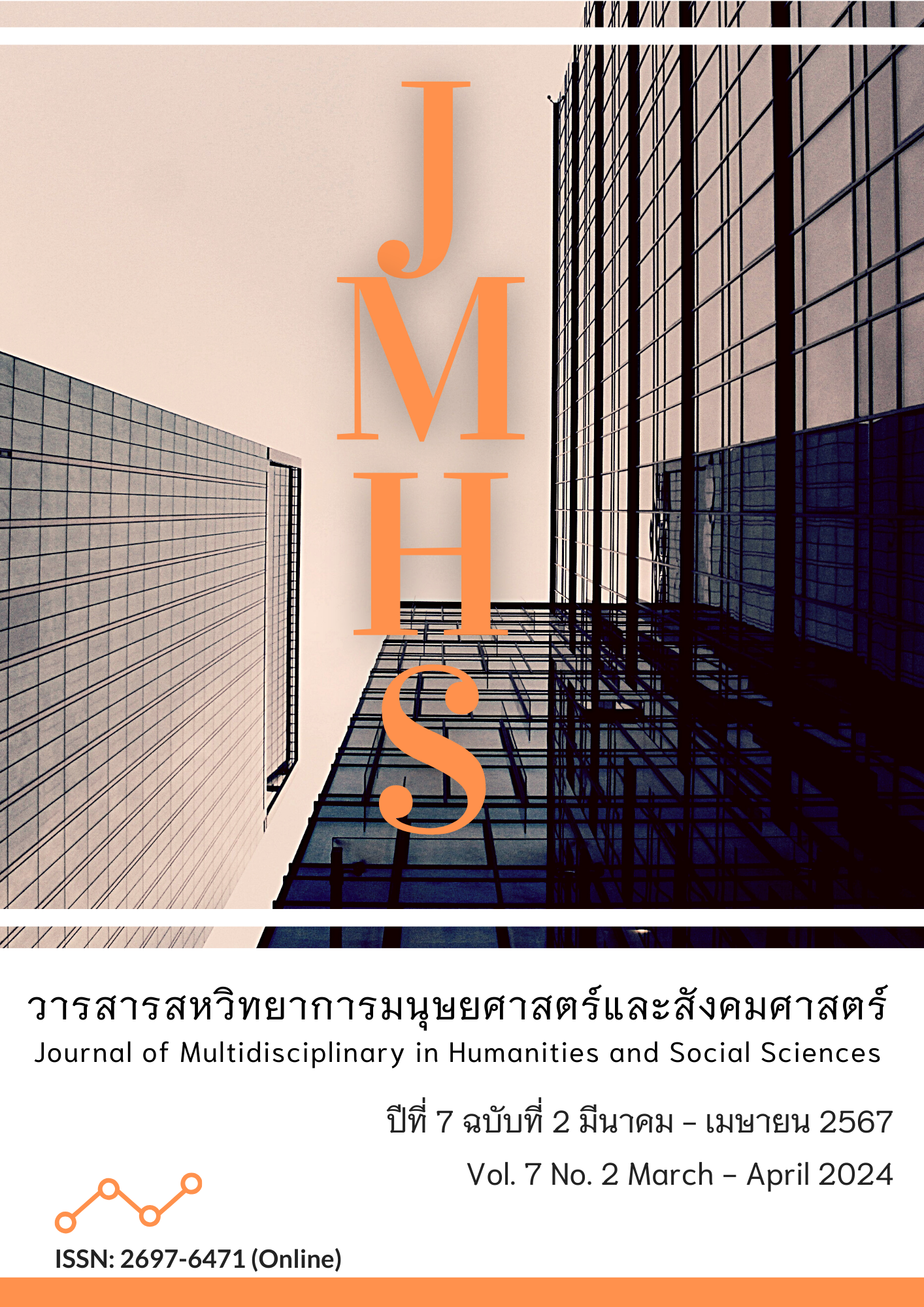How to Develop Thai Express Delivery Business for Sustainable Survival
Main Article Content
Abstract
The express transportation industry, both globally and in Thailand, is experiencing rapid growth due to changes in consumer behavior, such as online shopping. As a result, there is a need for efficient transportation of goods from local and international sellers to buyers. By 2023, the Thai express transportation market is projected to reach a value of 115 billion baht with an impressive growth rate of 18 percent. Despite advancements in logistics technology that have improved efficiency, there are still dissatisfied customers within the industry. Additionally, express transportation businesses face challenges, including financial losses and issues with their own transport employees. This study aims to explore sustainable development strategies for the Thai express transportation sector. The SLIMC Model provides valuable guidelines for this purpose, encompassing elements such as sustainability policies (S), enhancing logistics service quality (L), fostering innovation (I), improving management practices (M), and embracing corporate social responsibility (C). These guidelines can effectively steer the development of the Thai express transportation industry towards long-term sustainability.
Article Details

This work is licensed under a Creative Commons Attribution-NonCommercial-NoDerivatives 4.0 International License.
Views and opinions appearing in the Journal it is the responsibility of the author of the article, and does not constitute the view and responsibility of the editorial team.
References
กิตตินาท นุ่นทอง, ภัทรพล ชุ่มมี และ วงศ์ธีรา สุวรรณิน (2562). รูปแบบคุณภาพการบริการโลจิสติกส์ของผู้ให้บริการโลจิสติกส์ในประเทศไทย. BU Academic Review, 18(2), 26-41. สืบค้นจาก https://so01.tci-thaijo.org/index.php/buacademicreview/article/view/17325
เกียรติพงษ์ อุดมธนะธีระ. (2561). PDCA Cycle/วงจรการควบคุมคุณภาพ หรือวงจรเด็มมิ่ง (Deming Cycle). สืบค้นเมื่อ 30 พฤษภาคม 2566, จาก https://www.iok2u.com/index.php/article/ innovation/240-pdca-cycle-deming-
ตลาดหลักทรัพย์แห่งประเทศไทย. (2555). ความรับผิดชอบต่อสังคมขององค์กรธุรกิจ. สืบค้นเมื่อ 19 สิงหาคม 2565, จาก https://www.set.or.th/sustainable_dev/th/cg/files/2013/CGPrinciple2012Thai-Eng.pdf
เบญจพนธ์ มีเงิน. (2563). การพัฒนานวัตกรรมธุรกิจเพื่อความยั่งยืน: รูปแบบการพัฒนานวัตกรรมการให้บริการโลจิสติกส์ไทย. วารสารสังคมศาสตร์และมานุษยวิทยาเชิงพุทธ, 5(7), 92-111. สืบค้นจาก https://so04.tci-thaijo.org/index.php/JSBA/article/view/242224
ปุณณดา จิตรักญาติ และ ชื่นจิตต์ แจ้งเจนกิจ. (2563). ความสัมพันธ์ระหว่างคุณภาพการบริการการตระหนักรู้ในตราสินค้ากับความพึงพอใจด้านราคาขนส่งพัสดุ บริษัท เคอรี่เอ็กซ์เพรส จำกัด ของผู้ใช้บริการในเขตกรุงเทพมหานคร. วารสารสงขลานครินทร์ ฉบับสังคมศาสตร์และมนุษยศาสตร์, 26(3), 35-55. สืบค้นจาก https://so05.tci-thaijo.org/index.php/psujssh/article/view/251950
วิทยา ภัทรเมธากุล. (2560). ปัจจัยขับเคลื่อนที่มีอิทธิพลต่อความยั่งยืนขององค์การของห้องปฏิบัติการทดสอบในประเทศไทย. กรุงเทพฯ: มหาวิทยาลัยรามคำแหง.
ศูนย์วิเคราะห์ธุรกิจ TTB. (2566). TTB analytics คาดธุรกิจส่งพัสดุปี 2566 โตต่อเนื่อง. สืบค้นเมื่อ 10 มกราคม 2567, จาก https://www.ttbbank.com/th/newsroom/detail/e-commerce-delivery-2566
สถาบันไทยพัฒน์. (2565). ซีเอสอาร์ คืออะไร. สืบค้นเมื่อ 19 สิงหาคม 2565, จากhttps://www.thaicsr.com/2005/09/blog-post_112746387637126873.html
อดิศัย วรรธนะภูติ, จันทนา แสนสุข, อภิชยา นิเวศน์ และ สุตาภัทร จันทร์ประเสริฐ. (2562). การพัฒนารูปแบบการจัดการโลจิสติกส์เพื่อการท่องเที่ยว อำเภอพระนครศรีอยุธยา จังหวัดพระนครศรีอยุธยา. กรุงเทพฯ: มหาวิทยาลัยเทคโนโลยีราชมงคลสุวรรณภูมิ.
Ilker Murat AR. (2012). The Impact of Green Product Innovation on Firm Performance and Competitive Capability: The Moderating Role of Managerial Environmental Concern. Procedia - Social and Behavioral Sciences, 62, 854-864. https://doi.org/10.1016/j.sbspro.2012.09.144
Awan, U., Kraslawski, A., & Huiskonen, J. (2018). The Impact of Relational Governance on Performance Improvement in Export Manufacturing Firms. Journal of Industrial Engineering and Management, 11(2), 349-370 https://doi.org/10.3926/jiem.2558
Bateh, J., Heaton, C., Arbogast, G. W., & Broadbent, A. (2014). Defining Sustainability in the Business Setting. Journal of Sustainability Management, 1(1), 1–4. https://doi.org/10.19030/jsm.v1i1.8386
Cantele, S., & Zardini, A. (2018). Is Sustainability a Competitive Advantage for Small Businesses an Empirical Analysis of Possible Mediators in the Sustainability-Financial Performance Relationship. Journal of Cleaner Production, 182, 166-176. https://doi.org/10.1016/j.jclepro. 2018.02.016
Cheng, C. C., & Krumwiede, D. (2012). The Role of Service Innovation in The Market Orientation- New Service Performance Linkage. Technovation, 32(7–8), 487–497. https://doi.org/10.1016/j.technovation.2012.03.006
Dokbia Online. (2563). ธุรกิจขนส่งพัสดุปี 2020 มีแนวโน้มเติบโตต่อเนื่อง...ท่ามกลางการแข่งขันเข้มข้นจากแรงกดดันราคา. สืบค้นเมื่อ 20 พฤษภาคม 2566, จาก https://www.dokbiaonline.com/post/logistic
Ilker Murat AR. (2012). The Impact of Green Product Innovation on Firm Performance and Competitive Capability: The Moderating Role of Managerial Environmental Concern. Procedia - Social and Behavioral Sciences, 62, 854-864. https://doi.org/10.1016/j.sbspro.2012.09.144
Inkaew, P., & Namahoot, K. N. (2021). A Structural Equation Model of Innovative Parcel Delivery in Thailand. In National Postgraduate Student Colloquium 2021: Business Creativity and Innovation in the Age of Transformation. Phitsanulok: Naresuan University.
Krishnaswamy, S. et al. (2014). Conditional Density-Based Analysis of T Cell Signaling in Single-Cell Data. Science, 346(6213). https://doi.org/10.1126/science.1250689
Murfield, M., Boone, C. A., Rutner, P., & Thomas, R. (2017). Investigating Logistics Service Quality in Omni-Channel Retailing.
International Journal of Physical Distribution & Logistics Management, 47(4), 263-296. https://doi.org/10.1108/IJPDLM-06-2016-0161
Su, G., Logez, M., Xu, J., Tao, S., Villéger, S., & Brosse, S. (2021). Human Impacts on Global Freshwater Fish Biodiversity. Science, 371, 835-838. https://doi.org/10.1126/science.abd 3369


